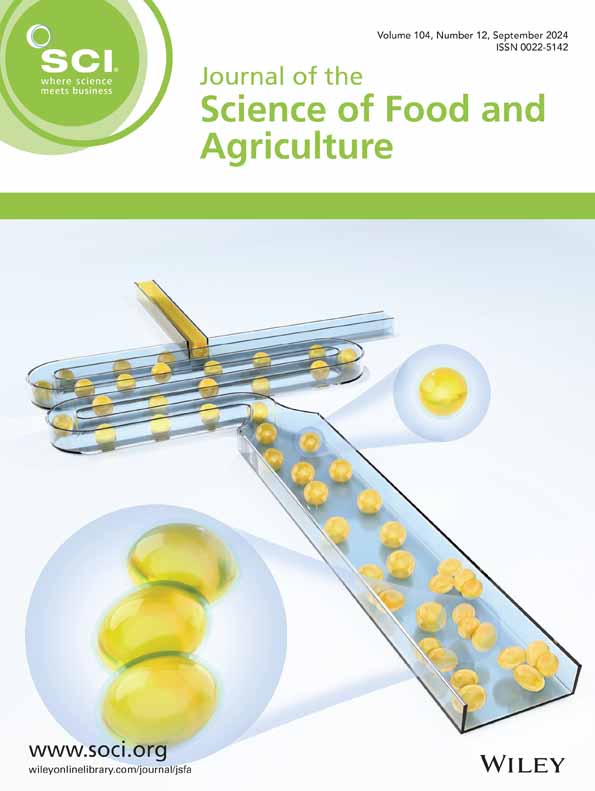求助PDF
{"title":"Oral responsive delivery systems for probiotics targeting the intestinal tract.","authors":"Mengzhen Han, Mengxin Hou, Shuang Yang, Zhenpeng Gao","doi":"10.1002/jsfa.13938","DOIUrl":null,"url":null,"abstract":"<p><p>The increasing prevalence of health issues, driven by sedentary lifestyles and unhealthy diets in modern society, has led to a growing demand for natural dietary supplements to support overall health and well-being. Probiotic dietary supplements have garnered widespread recognition for their potential health benefits. However, their efficacy is often hindered by the hostile conditions of the gastrointestinal tract. To surmount this challenge, biomaterial-based microencapsulation techniques have been extensively employed to shield probiotics from the harsh environments of stomach acid and bile salts, facilitating their precise delivery to the colon for optimal nutritional effects. With consideration of the distinctive gastrointestinal tract milieu, probiotic delivery systems have been categorized into pH-responsive release, enzyme-responsive release, redox-responsive release and pressure-triggered release systems. These responsive delivery systems have not only demonstrated improved probiotic survival rates in the stomach, but also successful release in the intestines, facilitating enhanced adhesion and colonization of probiotics within the gut. Consequently, these responsive delivery systems contribute to the effectiveness of probiotic supplementation in intervening with gastrointestinal diseases. This review provides a comprehensive overview of the diverse oral responsive delivery systems tailored for probiotics targeting the intestinal tract. Furthermore, the review critically examines the limitations and future prospects of these approaches. This review offers valuable guidance for the effective delivery of probiotics to the intestinal tract, enhancing the potential of probiotics as dietary supplements to promote gastrointestinal health and well-being. © 2024 Society of Chemical Industry.</p>","PeriodicalId":17725,"journal":{"name":"Journal of the Science of Food and Agriculture","volume":" ","pages":""},"PeriodicalIF":3.3000,"publicationDate":"2024-10-18","publicationTypes":"Journal Article","fieldsOfStudy":null,"isOpenAccess":false,"openAccessPdf":"","citationCount":"0","resultStr":null,"platform":"Semanticscholar","paperid":null,"PeriodicalName":"Journal of the Science of Food and Agriculture","FirstCategoryId":"97","ListUrlMain":"https://doi.org/10.1002/jsfa.13938","RegionNum":2,"RegionCategory":"农林科学","ArticlePicture":[],"TitleCN":null,"AbstractTextCN":null,"PMCID":null,"EPubDate":"","PubModel":"","JCR":"Q1","JCRName":"AGRICULTURE, MULTIDISCIPLINARY","Score":null,"Total":0}
引用次数: 0
引用
批量引用
Abstract
The increasing prevalence of health issues, driven by sedentary lifestyles and unhealthy diets in modern society, has led to a growing demand for natural dietary supplements to support overall health and well-being. Probiotic dietary supplements have garnered widespread recognition for their potential health benefits. However, their efficacy is often hindered by the hostile conditions of the gastrointestinal tract. To surmount this challenge, biomaterial-based microencapsulation techniques have been extensively employed to shield probiotics from the harsh environments of stomach acid and bile salts, facilitating their precise delivery to the colon for optimal nutritional effects. With consideration of the distinctive gastrointestinal tract milieu, probiotic delivery systems have been categorized into pH-responsive release, enzyme-responsive release, redox-responsive release and pressure-triggered release systems. These responsive delivery systems have not only demonstrated improved probiotic survival rates in the stomach, but also successful release in the intestines, facilitating enhanced adhesion and colonization of probiotics within the gut. Consequently, these responsive delivery systems contribute to the effectiveness of probiotic supplementation in intervening with gastrointestinal diseases. This review provides a comprehensive overview of the diverse oral responsive delivery systems tailored for probiotics targeting the intestinal tract. Furthermore, the review critically examines the limitations and future prospects of these approaches. This review offers valuable guidance for the effective delivery of probiotics to the intestinal tract, enhancing the potential of probiotics as dietary supplements to promote gastrointestinal health and well-being. © 2024 Society of Chemical Industry.
针对肠道的益生菌口服给药系统。
现代社会久坐不动的生活方式和不健康的饮食导致健康问题日益普遍,因此人们对天然膳食补充剂的需求不断增长,以支持整体健康和福祉。益生菌膳食补充剂因其潜在的健康益处而获得广泛认可。然而,它们的功效往往受到胃肠道恶劣条件的阻碍。为了克服这一难题,人们广泛采用了基于生物材料的微胶囊技术,以保护益生菌免受胃酸和胆汁盐等恶劣环境的影响,使其能够精确地输送到结肠,从而达到最佳的营养效果。考虑到独特的胃肠道环境,益生菌释放系统被分为 pH 响应释放系统、酶响应释放系统、氧化还原响应释放系统和压力触发释放系统。这些响应式释放系统不仅提高了益生菌在胃中的存活率,还成功地在肠道中释放了益生菌,促进了益生菌在肠道中的粘附和定植。因此,这些反应灵敏的给药系统有助于提高益生菌补充剂在干预胃肠道疾病方面的有效性。本综述全面概述了为肠道益生菌量身定制的各种口服给药系统。此外,该综述还批判性地探讨了这些方法的局限性和未来前景。本综述为将益生菌有效输送到肠道提供了宝贵的指导,提高了益生菌作为膳食补充剂促进肠道健康和福祉的潜力。© 2024 化学工业协会。
本文章由计算机程序翻译,如有差异,请以英文原文为准。

 求助内容:
求助内容: 应助结果提醒方式:
应助结果提醒方式:


